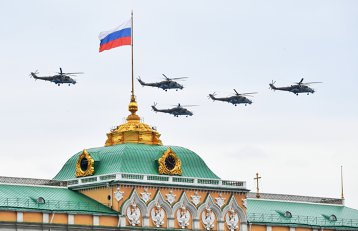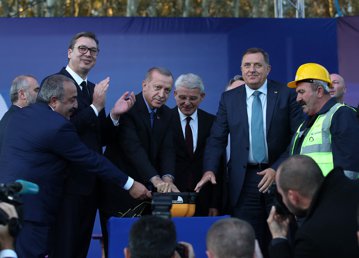
The US Intelligence Community- between expertise and loyalty
After Donald Trump called it part of the deep state, which knows nothing about reality, hence, suggesting the lack of professionalism and experience, the intelligence community experts have provided, whenever they had the opportunity, during time, an image of vulnerabilities and threats against state’s security, accordingly with White House’s vision.

Between professionalism and experience, we choose loyalty
“Mr. President, you should have your own team, good luck!”
This is the affirmation made in the resignation letter by Sue Gordon, the deputy director of the National Intelligence Community, the one who was about to become temporary director after Dan Coats’ leaving from the National Intelligence’s running. What’s truth and what irony in Sue Gordon’s affirmation? How much does the president needs loyal people to lead the intelligence agencies, the defence and public order structures and what can and cannot do these people if they do not have the necessary experience in the field?
Similarly, what’s truth and what’s irony in Donald Trump’s statement “agencies went crazy… we need someone to stop them”? It is, indeed, true that state’s structures are chaotic or it is actually an order the president does not get and want?
Everyone knows that the White House leader and the intelligence agencies did not get along since the president took the power, but the situation is raising serious questions lately, given that Donald Trump’s new mandate is at the corner and that, strategically, America has to offer some serious answers.
A new constant: the interim
Joseph Maguire, the chief of the National Center for Terrorism Combat, is the one to become the National Intelligence interim, by 15th of August, after the initial designation, the “great republican congressman”, John Ratcliffe, was “unfairly treated by lamestream mass media”, as Donald Trump called it.
Both chief of intelligence community’s resignations seem to announce an even more difficult period for the 17 agencies, for their relation with the Administration, for their basic activity, which is providing essential information to protect security and make political decisions and wherefore are allocated around $60 billion.
After Donald Trump called it part of the deep state, which knows nothing about reality, hence, suggesting the lack of professionalism and experience, the intelligence community experts have provided, whenever they had the opportunity, during time, an image of vulnerabilities and threats against state’s security, accordingly with White House’s vision.
“....Iran’s very ignorant and insulting statement, put out today, only shows that they do not understand reality. No more John Kerry & Obama!”
“Their Economy is dead, and will get much worse. Iran is a total mess… any attack against the American territory will be fought back with an overwhelming force…”
“China is a currency manipulator… China can only hope a democrat will win, so that they will continue America’s destruction and the theft of billion dollars!”
“Things are going along very well with China. They are paying us Tens of Billions of Dollars, made possible by their monetary devaluations and pumping in massive amounts of cash to keep their system going. So far our consumer is paying nothing - and no inflation.”
“....also a small apology for testing the short range missiles, which terrified the US allies in the region…and that this testing would stop when the exercises end.”
These are just some of the recent, already famous, tweets sent from the Oval Office which, surely, are not based on intelligence structures’ information.
In fact, Dan Coats, the communication director, Gina Haspel, CIA director, Christopher Wray, FBI director, Paul Nasakone, NSA director, Robert Cardillo, NGIA director, Robert Ashley, DIA director have all denied the information the president has in terms of security, within the annual hearing in front of the Senate: Iran, Syria and Afghanistan, the Islamic State.
Not only that foreign policy estimations are not in line with President Donald Trump's perspectives, as not only are news agencies are facing employee resignations, for the same reason.
Rod Schoonover, a 10-year State Department analyst, who resigned in July, accuses the Trump administration of undermining evidences, systematically suppressing science and the objective analysis in terms of climate threats and their impact on national security. Schoonover's resignation is the latest example of how the Trump Administration, dominated by a culture of fear, censorship and repression (Joel Clement, a former Home Department employee), addresses environmental policies and intelligence assessments on climate changes.
Within the Homeland Security Department, part of the intelligence community, three secretaries have led the department, in less than three years, there are many important available positions, and more than half of the people running positions are interim. Similar situations are facing the Justice Department and the State Department, according to which keeping a large number of available positions would be part of Trump’s plan, the president saying he likes flexibility, in fact, temporary officials are easier to convince in terms of Trump's approaches.
In the intelligence community, employees are ironically saying that the only constant in their world is change.
In May, Kirstjen Nielsen, who runs the Homeland Security Department, resigned after a Cabinet meeting, where she was humiliated by the president because she is not tough enough regarding measures on immigration. Although publicly Nielsen backed the president, privately, according to CNN, she stated that Trump is becoming more and more ruthless and makes unreasonable and even impossible demands. The resignation came three days after Donald Trump surprisingly withdrew his nomination for Ronald Vitiello, for the director of Immigration and Customs Enforcement position within the department, reasoning that he wants to go to - a tougher direction. At the time, everyone thought that secretary’s resignation is not the one to look after, but the fact that Nielsen has withstood something more than a year in office, given that during her mandate were adopted the most controversial immigration policies in the current administration. On May 24, Lee Cissna, director of United States Citizenship and Immigration Services, also part of Homeland Security Department, was delivering her resignation, at the request of the president.
The Defence Department has also "benefited" from these constant changes. Since July, Mark Esper became the acting Secretary of Defence. It had been seven months since the Secretary of Defence, Jim Mattis, resigned after disputing with President Donald Trump, something that culminated in his protest over Administration's intentions to withdraw troops from Syria.
In the midst of an Iranian crisis, while Russia was withdrawing from a treaty and North Korea was testing missiles, the US did not have a confirmed Pentagon chief in office, being the longest period of this kind in history, as many other key civil and military positions within the Defence Department were interim. In June, initially nominated by the president, Patrick Shanahan had resigned as interim secretary.
Eight Democratic senators voted against Esper's nomination, as he was criticized for his ties to the military industrial complex (Raytheon). Mark Esper is known for his concerns on the acquisition of new weapons for a high-intensity conflict with countries such as China or Russia and as president Trump’s ally in deploying troops at the US-Mexico border.
But the question that everyone following Mark Esper’s work are raising is whether he can play a positive political role in term of Iran and whether he can counter the firm positions of National Security Advisor, John Bolton, and Secretary of State, Mike Pompeo, the one that former and current intelligence officials are stating that he is influencing the US intelligence community a lot, more than a year after he left CIA for the State Department.
When president’s opinions become gospel truth
Mike Pompeo would be a key middleman between Trump and the intelligence community, an unusual role for a secretary of state, who is supposed to be intelligence community’s client, not its master. Some are saying that Donald Trump will increasingly rely on Mike Pompeo in terms of national security.
The same officials are unhappy that while serving as CIA director, Pompeo frequently allowed Trump's attacks on the intelligence community, supposedly a deep state bastion and became president's partner in politicizing information.
In fact, community’s briefings made in for the president by community leaders no longer have in-depth analysis of the issues, but rather key points, as Donald Trump likes images and graphics more.
One of these leaders seems to be taking particular care not to contradict president's views: Gina Haspel, CIA director.
Her still having this position would be thanks to keeping a low profile, a quality most likely acquired during the times she was working as a covered officer. Gina Haspel, unlike former directors, is generally absent, refusing to give interviews or comments, and she gave, since she is in office, only two public speeches at two universities, seen as short and lacking of content. After becoming director, in May 2018, Haspel would have confessed to a colleague that an interview can only have to effects: bad and awful.
Haspel seems to have come to the conclusion that there is no benefit to Donald Trump's denial, but wagging tongues consider official's independence to be questionable, given her links to CIA's secret detention and torture program.
“Intelligence’s role has never been more critical”
Given this context full of dismissals, resignations and controversial appointments that are defining the intelligence agencies and defence and public order structures, it is no wonder that more and more questions are being raised, given President Donald Trump insists on being confident that his meetings with Kim Jong Un will cause North Korea to give up nuclear weapons, that he continues to threaten Iran or refuse various warnings from the intelligence community, including Russia's possible interference in next year's elections.
“It is apparent that the President is only comfortable with people who tell him what he wants to hear or are willing to make themselves complicit in pushing his views Needless to say, any efforts to politicize or personalize the IC is dangerous… the public’s faith in the community is fragile and if it is seen as simply a political tool for one party or another, we will have lost a critical weapon in keeping us safe” (John Sipher, former CIA officer).
“Both Coats’ and Gordon’s resignations represent a significant loss for the country at a time when we face complex security challenges. The role of intelligence in speaking truth to power has never been more critical…” (Matthew Olsen, former National Counterterrorism Center director).
“The willingness to speak “truth to power” and being able to speak truth to power are not the same. Whomever it may turn out to be, has that relationship, it may prove to have a positive impact on the IC” (John Bennett, former CIA operations director)
An awaiting conclusion
The problem is how will refusing the reality provided by intelligence, whatever that may be, can have disastrous consequences for the security of both the US and its partners and allies. Placing key characters to support president's truth and personal analysis of the world reminds us of the George Tenet, George W. Bush and Saddam Hussein’s "times".
In CIA’s main hall is engraved the biblical verse “then you will know the truth, and the truth will set you free”, suggesting that what the intelligence community offers can and should be the strong base for the political leaders in how they are making decisions.
Maybe this is why there are voices claiming that a great number of professionals within the intelligence community are waiting for the current Administration to end, so that the next one to actually use their capacities and expertise.
Translated by Andreea Soare


